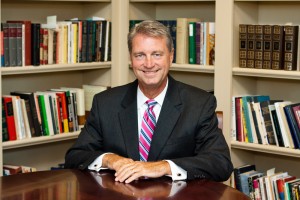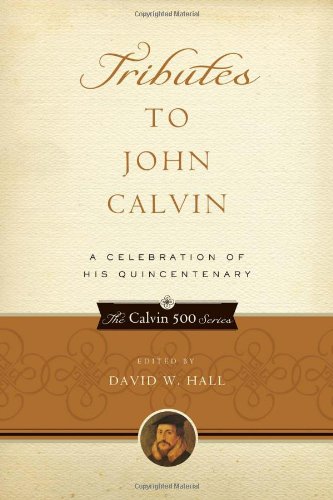Did you know that the Protestant Reformation – and John Calvin in particular – had a sizable impact on government and politics also, and not just theology? Welcome back to Books At a Glance! I’m Fred Zaspel, and we’re talking again with Dr. David Hall, and this is the question we’ll take up today.
David, welcome—great to have you with us again.
David Hall:
Thanks.
Zaspel:
To show the before/after, name the Republics prior to Swiss city-states at Calvin’s time?
Hall:
One of the reasons Calvin went to Geneva and found Geneva as a safe haven was that the Genevan citizens did something absolutely revolutionary for the time. In fact, they had a bloodless revolution. As they gathered in their city in their town square and voted to declare themselves Protestant and free from the Roman Catholic diocese. As such, Geneva became about the fourth Swiss city-state to declare itself an independent republic.
Prior to that time, in the period roughly 1525 – 1535, prior to that time if you got in your ship or in an airplane if you could buy one 400 years before they were invented and flew around the world, you could not find but one tiny Republic in the whole universe. Everything was hierarchical. Every government was monarchical except for the small city-state of Venice. Which some even think was probably influenced by Savonarola and some of the pre-reformer, Italian reformers. Nevertheless, there simply were no republics at that time. So, when Calvin starts preaching about republicanism, (with a small ‘r,’ not like the American Republican party with a capital ‘R,’ but with a small ‘r,’ republicanism as a form of government), that was a new novelty to political discourse of the day. There simply were, in Europe, no republics except for the small Protestant Reformation city-states – Bern, Zürich, Basel, Strasburg, and Geneva.
So there were some changes. And following him, the interesting thing is that Calvin’s disciples actually created a political tradition. From the year 1550 to 1600 there was a whole spate of political tracts and treatises that were written by Calvin’s disciples. His chief lieutenant, Theodore Beza, authored one in 1574 that was a powerful apology for limited government. Setting that the ruler had certain tasks that he was assigned by God and he shouldn’t usurp into other areas. Many of Calvin’s other associates, John Knox among them, John Ponet, who died an early death and others wrote groundbreaking theological political tracts arguing against monarchy; arguing against the hierarchy both in church and in state.
So the progress of the Reformation was not only in the church, where there was a move away from a triangular shaped flowchart with the Pope at the top; but the same kind of flowchart began to develop in the civil sphere under Calvin and his disciples’ teachings. Calvin himself obviously commented on Romans 13, but throughout his commentaries and in the Institutes as one of the early systematic theology texts. Calvin’s Institutes, Book 4, in the final chapter, Chapter 20, devotes more of a discussion to the role of the civil magistrate than any Protestant textbook probably for centuries. It would be, most likely, 200 years later before more was developed within the corpus of the systematic theology texts.
Zaspel:
Where and what did Calvin teach about the role of the state?
Hall:
He taught that the state had a limited charter. Let me give you the summary to save time, the five points of political Calvinism. I’ll get to the last one, which is the direct answer, but let me set this up, if I could.
D is for depravity. Calvin said human government must be informed by the anthropology that St. Augustine taught, which suggests that we are sinful through and through and that if human beings are allowed to break laws and not have constitutions, they would do so. So Calvin’s view of politics began with depravity. In fact, one of my favorite quotes that I love to tell people is – I read them James Madison’s comment. He has a short comment in Federalist Papers 51 that says, “but what is government itself, but the greatest reflection of human nature.” And then Madison, the American founder, says, “if men were angels, no government would be necessary.” Well, lo and behold, I’m preparing a sermon series on Galatians and I find – look what Calvin says in his commentary on Galatians. Two centuries earlier, Calvin said, “if we were all like angels, blameless and freely able to exercise perfect self-control, we would not need rules or regulations.”
Madison was probably unaware of where he was plagiarizing that, but it probably came from his Scottish influence through Princeton, but nonetheless Depravity was the beginning of Calvin’s view of politics. I don’t have a nice pneumonic like TULIP, mine is DARCL, which is very hard to remember, but is representative. D is for depravity; the A is for accountability—all governors and governments must have accountability and they are accountable to God as well as to the citizens. The great covenant theology that Calvin’s disciples wrote about is encapsulated there.
The R, as I mentioned earlier, is for small ‘r’ republicanism as the desired form of government, not a monarchy; although Calvin lived under a monarchy, he didn’t foment revolution, but from Scripture Calvin actually thought he spied senators as early as his comment on Jethro’s advice to Moses in the book of Exodus.
So there’s Depravity with the D; Accountability is the A; R is Republicanism; C is Collegial leadership—that is a group leadership. Calvin and his disciples were very uncomfortable with one individual running either the state or the church. So there was a group of leaders in church government, those are called elders. In civil government those are called senators, representatives, etc.
Then the fifth point of political Calvinism, the L is Limited government. Calvin believed that God has set up several spheres of government, not just the civil government; but that the family was the first level of that and they had their own charter. They were to do their jobs without interference or without trying to do other jobs. The second level of government is the church government. The church had its own calling and tasks, and the civil government wasn’t to try to interfere with that nor should families usurp that. And then the third level of government is the civil government, the civil magistrate. And all of those spheres, Calvin wrote, were limited to the prescriptions that God gave for them. Those teachings became a flood of alteration in political societies in the West, particularly as the Puritans spread westward and brought their Calvinism with them.
Zaspel:
I’ve read the quote before, I don’t know who it came from or if it’s just generically quoted, I’m not sure, but that John Calvin has been referred to as the founder of America. Is that overblown? How is that true?
Hall:
Well, yes and no. I would modify that to say Theodore Beza was the point guard of the American Revolution. Since its March and we’re all interested in basketball tournaments, sometimes the point guards aren’t that famous. But Theodore Beza actually took Calvin’s seed principles, taught them, and those teachings were embraced several centuries later by the founders of America. And—as most of your audience would be aware—of those who listen to the sermons week in and week out heard Calvinistic sermons as a steady diet for centuries.
Zaspel:
We’re talking to Dr. David Hall about the Protestant Reformation. Next time he will talk to us about John Calvin and the Reformation of the Family. Thanks for joining us on Books At a Glance.
Editor’s Note: Here are some related resources from Dr. David Hall
Tributes to John Calvin: A Celebration of His Quincentenary
wtsbooks
Amazon
Lectures on Integrity: A Review of Confessional Subscription as an Aid for Orthodoxy and Orthopraxy
Amazon
Post Tenebrae: Essays on Calvin and Calvinism
Amazon
The Genevan Reformation and the American Founding
Amazon
To Glorify and Enjoy God: A Commemoration of the 350th Anniversary of the Westminister Assembly (co-author with John L. Carson)
wtsbooks
Amazon
The Legacy of John Calvin (2008)
wtsbooks
Amazon
Calvin and Commerce: The Transforming Power of Calvinism in Market Economies (2009)
wtsbooks
Amazon
Preaching Like Calvin: Sermons from the 500th Anniversary Celebration (2010)
Amazon
Calvin in the Public Square: Liberal Democracies, Rights and Civil Liberties (2009)
wtsbooks
Amazon
Essays in Calvin and Calvinism (kindle editions, 2014-2015)
Volume 1
Volume 2
Volume 3
A Theological Guide to Calvin’s Institutes: Essays and Analysis (2008, 2015) (with Peter Lillback)
wtsbooks
Amazon
Calvin and Culture: Exploring a Worldview (2010) (with Marvin Padgett)
wtsbooks
Amazon

